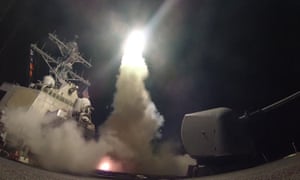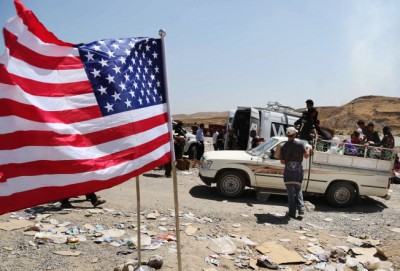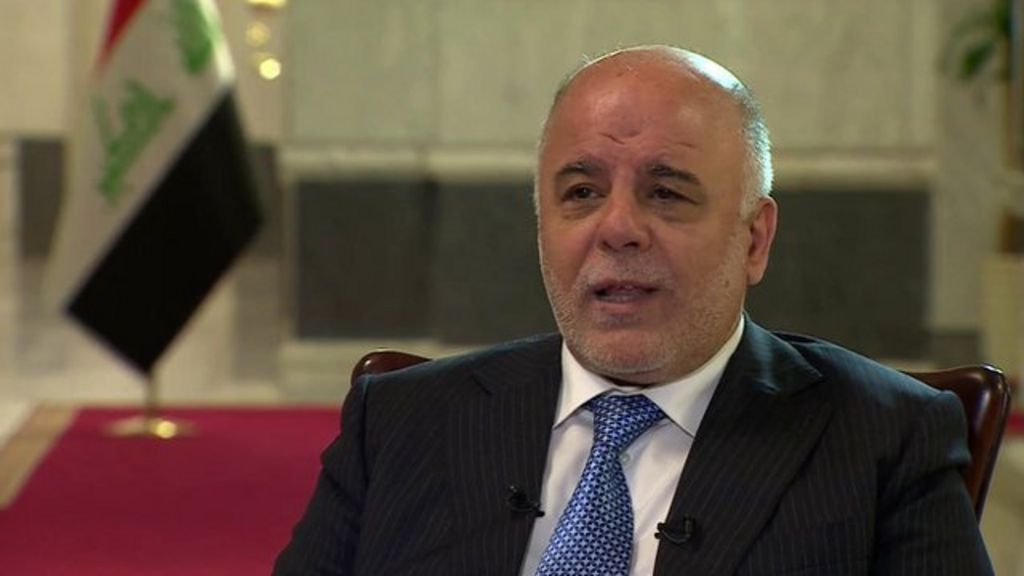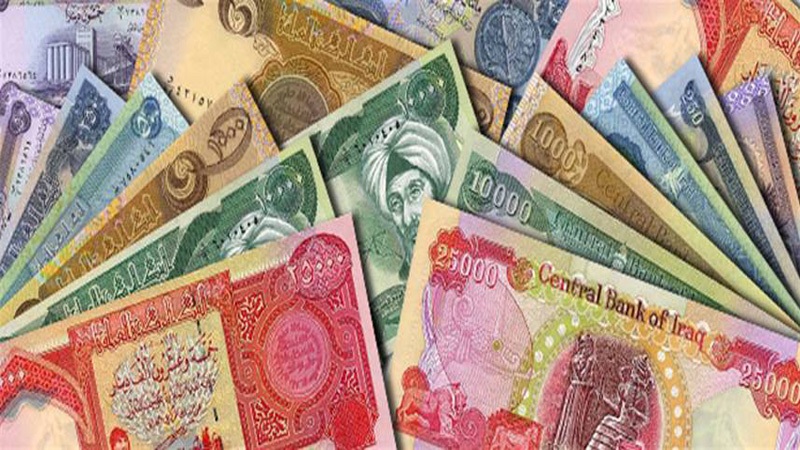US airstrikes on Syria: what we know so far
The US has launched a missile strike against Syria for the first time since the civil war began, targeting an airbase from which the US said this week’s chemical weapons attack on civilians was launched by Bashar al-Assad’s regime.
Live Second attack on Syrian town hit by chemical weapons reported after Trump strikes in Idlib – live
American military strike hits airbase in Syria in retaliation for what US president called ‘horrible chemical weapons attack’ in Idlib
What we know so far
The airstrikes targeted Shayrat airbase near Homs. The US has said this is the location from which Syrian forces launched a sarin nerve gas attack on the rebel-held town of Khan Sheikhun on Tuesday morning.
The Pentagon said 59 Tomahawk cruise missiles were launched from the warships USS Ross and Porter in the eastern Mediterranean in the early hours of Friday morning, local time.
A Syrian official told the Associated Press that at least seven were killed and nine were wounded in a US missile attack on the airbase. Reuters reported that the Syrian state news agency said the strikes killed nine civilians, including four children, in areas near the targeted airbase. The death toll has not been independently verified.
Some reports said senior officers had evacuated the base before the airstrikes happened and after foreign countries were notified of an imminent attack by the US.
President Bashar al-Assad’s office said the strike was “foolish and irresponsible” and “revealed its short-sightedness and political and military blindness to reality”. It said the government would redouble its efforts against rebel groups after the strike, adding: “the disgraceful act of targeting a sovereign state’s airport demonstrates once again that different administrations do not change deeper policies.”
Syrian rebels welcomed the strike and called for additional action. “Hitting one airbase is not enough – there are 26 airbases that target civilians,” a key figure in the Army of Islam faction, Mohamed Alloush, said on Twitter. “The whole world should save the Syrian people from the clutches of the killer Bashar [al-Assad] and his aides.
Russia, a Syria ally that has been helping the Assad regime target rebel-held districts, condemned the US action. Vladimir Putin’s spokesman, Dmitry Peskov, said the president regarded the strikes as “aggression against a sovereign state in violation of international law, and under a false pretext”.
Peskov said Trump’s move would have consequences for relations between the two countries. “With this step Washington has struck a significant blow to Russian-American relations, which were already in a sorry state.”
A Russian defence ministry statement read on state television said the US attack had been “ineffective” and claimed Syrian authorities were looking for 36 Tomahawk missiles that fell outside the base and missed the target. The statement also confirmed Russia would stop cooperation and communication with US forces in Syria.
Shortly thereafter, the Russian military said it would help Syria strengthen its air defences after the strike to help “protect the most sensitive Syrian infrastructure facilities”.
The US secretary of state, Rex Tillerson, said the strikes did not indicate a shift in US policy towards Syria, despite it being a significant change from the previous stance taken by the Trump administration. Tillerson said Russia bore responsibility for its handling of the 2013 deal that was supposed to remove Assad’s stockpile of chemical weapons.
The Pentagon confirmed Russia had been told in advance of the strike through military channels, despite earlier claims from Tillerson that there had been no contact.
Hillary Clinton called for the US to “take out” Syrian government-controlled airfields just hours before Trump launched airstrikes.
The world reacts to Trump’s Syria airstrikes
The move was supported by key US allies, including the UK, Australia, Israel and Saudi Arabia. Italy and Japan said they understood the action taken by the US.
The UK defence secretary, Michael Fallon, said the British government was not asked to provide military support to the US attack but believes it was a “wholly appropriate”. “We’re not committed to military action against Syria. Our parliament considered that before, back in 2013, and turned it down,” he said.
Iran, Assad’s regional backer, said it “strongly condemned” the strikes, as it condemned “all unilateral military action”. It said the action was taken under the “pretext” of the chemical strike. Bahram Ghasemi, Tehran’s foreign ministry spokesman, said the attack “strengthens the near-to-death terrorists and complicates the situation in Syria and the whole region”.
The UN coordinator for humanitarian affairs, Jens Laerke, says it had no sign that US military strikes against a Syrian airbase had had “any direct consequence” on overall aid operations in Syria. A UN human rights office spokeswoman, Ravina Shamdasani, said on Friday at a UN briefing that use of chemical weapons, if confirmed, would amount to a war crime.
Nato’s secretary general, Jens Stoltenberg, said Assad “bears full responsibility” for the US airstrikes against an airbase in Syria. The European commission said Jean-Claude Juncker “understands efforts to deter future attacks” and that the EU stood ready to play its role in finding a political solution to the crisis.
The Syrian Observatory on Human Rights said airstrikes may have struck Khan Sheikhun on Friday.
Read more: http://www.dinarupdates.com/showthread.php?48026-US-airstrikes-on-Syria-what-we-know-so-far
A Dinar Updates “FaceBook Live”!!
“LIVE Q&A with BGG”
tonite 6:30pm CST – Apr 7th
In the DU FaceBook Group!!
https://www.facebook.com/groups/571383766355188/
___________________________________________________________

___________________________________________________________
Key moments from the U.S.-led campaign in Iraq and Syria
 US.-led forces have been carrying out airstrikes against Islamic State militants in Iraq and Syria since 2014, but have tried to avoid getting drawn into Syria’s ruinous civil war. On Thursday, President Trump authorized the deployment of cruise missiles against a Syrian air base in retaliation for an apparent poison-gas attack that U.S. officials say was carried out by President Bashar Assad’s military.
US.-led forces have been carrying out airstrikes against Islamic State militants in Iraq and Syria since 2014, but have tried to avoid getting drawn into Syria’s ruinous civil war. On Thursday, President Trump authorized the deployment of cruise missiles against a Syrian air base in retaliation for an apparent poison-gas attack that U.S. officials say was carried out by President Bashar Assad’s military.
Read more: http://www.dinarupdates.com/showthread.php?48025-Key-moments-from-the-U-S-led-campaign-in-Iraq-and-Syria
___________________________________________________________
Follow us on twitter @DinarUpdates !!
 Dinar Updates – “NEWS TIME” w/BGG & Company – April 9th 7:30pm CST – In the DU CHAT Room!!
Dinar Updates – “NEWS TIME” w/BGG & Company – April 9th 7:30pm CST – In the DU CHAT Room!!
www.DinarUpdates.com – save as favorite
___________________________________________________________
Safe Zones As Soft Military Occupation: Trump’s Plan For Syria, Iraq Is Taking Shape
 The Trump administration is moving closer to its goal of creating “safe zones” within Syria. Though this strategy may be described as a humanitarian effort, the sizable increase in military presence that it will bring looks more like an invasion in disguise.
The Trump administration is moving closer to its goal of creating “safe zones” within Syria. Though this strategy may be described as a humanitarian effort, the sizable increase in military presence that it will bring looks more like an invasion in disguise.
Soon after his inauguration, President Trump stoked concerns regarding of U.S. intervention in Syria after announcing his plan to create so-called “safe zones” within Syria. At the time, Trump had ordered Secretary of State Rex Tillerson, along with Secretary of Defense James Mattis, to create a plan within 90 days to create such “zones” within Syria in order to allow refugees in the war-torn nation to “await firm settlement, such as repatriation or potential third-country resettlement.”
Trump stated that this approach was preferable to the strategy adopted by European Union nations that resulted in the controversial influx of millions of refugees from Syria and other countries. As analysts noted at the time, the move, despite its allegedly humanitarian motivations, risked sparking something much more grave: the escalation of U.S. military involvement in Syria, which would greatly heighten the risk of conflict between the US. and the Syrian government, along with its Russian allies.
Now, it appears that Tillerson and Mattis are quickly approaching the completion of their strategy for the establishment of Syrian “safe zones” after Tillerson recently confirmed the administration’s commitment to the measure in both Syria and Iraq at a summit held for a 68-member U.S.-led coalition that is targeting Daesh.
Though the details of the plan have yet to be released, many members of the coalition and members of previous U.S. presidential administrations have voiced their concerns that “safe zones” would be ineffective, concerns that Trump himself once echoed in criticizing Hillary Clinton’s advocacy for such zones in the 2016 election. For example, Portuguese Foreign Minister Augusto Santos Silva stated that his government was “never close to favoring this solution,” arguing that forcing refugees “to stay in their country when you cannot ensure that they won’t be attacked by some of the warring factions” fails to comply with international law.
Indeed, the U.S.-led coalition seems quite unqualified to oversee civilian safety, as bombing campaigns in recent months have claimed more innocent Syrian and Iraqi lives than military actions taken by Daesh or any other faction currently active in those countries.
In addition, tensions between coalition members and some U.S. allies in the region threaten even the feasibility of establishing the zones in the first place. Any plan to establish the zones would require cooperation with Russia and Syria, who are likely to oppose any such measure, as the zones would necessitate a massive increase in the U.S. military presence in Syria. Furthermore, the zones are set to be held by a still undetermined mix of Turkish, Kurdish and Western forces – an unlikely combination due to the often explosive antagonism between the Turks and the Kurds.
Brian McKeon, former undersecretary of defense for policy in the Obama-era Pentagon, echoed such concerns, stating that safe zones would be counter-productive in the fight against Daesh in an interview with Foreign Policy:
“A safe zone in theory assumes some agreement on the part of the Russians, Turks and possibly Syrians to yield sovereignty, or you don’t have agreement. The number of assets it would take to defend against potential attacks would likely be to the detriment of the counter-ISIL campaign.”
Safe Or Subterfuge? Zones Will Bring Large And Enduring Military Presence
Image result for safe zone syria
Considering that such “safe zones” will in no way guarantee safety of any kind and may be entirely impossible to implement due to Turkish-Kurdish tensions, the Trump administration’s commitment to such measures – along with other actions they have recently taken in the region – suggest that their real motivation is something else entirely.
Most telling of all is the fact that the debate over safe zones has coincided with the increased movement of U.S. troops and military assets into Syria and Iraq, such as the U.S.’ recent deployment of 2,500 soldiers to both Iraq and Syria. In addition, the U.S. government has signaled that these troops will remain in those nations long after Daesh is no longer deemed a threat.
For instance, hidden within the announcement of U.S. troop deployment in the Syrian city of Raqqa was the admission that the troops will be “required” to stabilize the region after Daesh’s defeat, as U.S. officials anticipate that “America’s allies” will need assistance in establishing “Syrian-led peacekeeping efforts” in the region for the foreseeable future. As for the forces to be deployed to Iraq, Tillerson confirmed that they would remain in Iraq after the defeat of Daesh in Mosul, despite his promise that no “nation-building” would take place afterwards.
Any additional forces deployed in Syria and Iraq for the establishment of “safe zones” would also ostensibly form part of an indefinite military presence within nations that have not authorized their operations within their borders – making these troop movements tantamount to an invasion. Moreover, the recent announcement from the Pentagon that they would no longer be publicly announcing subsequent troop deployments suggests that the U.S. government is seeking to obfuscate what is set to be a drastic increase in U.S. military presence in both Syria and Iraq – an increase set to spark geopolitical tensions in the region and beyond.
Ultimately, these safe zones – despite their humanitarian function – seem to be nothing more than an excuse to justify an increased U.S. military presence within Syrian and Iraqi borders – forces which, by the military’s own admission, have no intention of leaving anytime soon.
Watch A US armored convoy enter the city of Manbij, Syria:

____________________________________________________________
A Dinar Round Table Call!!
“with the whole DU Crew”
from Tues nite – Apr 4th
Click-N-Listen!!
Smart phone user link – Click here
____________________________________________________________
Abadi: Iraq is improving in its credit rating
 Independent Iraqi News Agency – Baghdad Prime Minister Haider Abadi said that Iraq has improved its credit rating.
Independent Iraqi News Agency – Baghdad Prime Minister Haider Abadi said that Iraq has improved its credit rating.
Abadi promised this improvement “despite the drop in oil prices and the low revenues as a success in itself.”
“There is an improvement in the low-income government agreement for low-income people, offset by a reduction in spending for high-income earners
Content Link
Read more: http://www.dinarupdates.com/showthread.php?48012-Abadi-Iraq-is-improving-in-its-credit-rating
____________________________________________________________
The final proof of greatness lies in being able to endure criticism without resentment. – Elbert Hubbard
____________________________________________________________
BGG (Dinar Guru) – When we talk about the price tag the IMF and the UN have put on Mosul…one has to wonder exactly what leverage the UN has in this game… It is clear what say the IMF has – they are the IMF… but the UN, on the other hand, not so clear…unless viewed through this narrow window. I doubt the UN will allow Iraq an immediate exit from Chapter 7 – the sanctions, yes… the protection… I just doubt it. What does this mean for us? As long as they are doing as the IMF and UN have laid out for them – no reason the IMF and the UN won’t support a return “international acceptance and integration”…and that is all any of us care about. [what has to happen for them to get out of chapter 7] A better question – and the one we all really want to know is… do they even have to be fully out of Chapter 7? My guess. No – they do not…
Read More: http://www.dinarupdates.com/observer/

Eat Well – Lose Weight!!
1bobby (Dinar Guru) – …if we look at CH 7, the 2 big ones that were given back to Iraq were the right to defend themselves and control of their currency. Having the U.N announce the removal of CH 7 to the world is what Abadi’s looking for.
Read More: http://www.dinarupdates.com/observer/
The Dinar Round Table Call!!
“with the whole DU Crew”
from Tues nite – Mar 14th
Click-N-Listen!!
Smart phone user link – Click here
Report .. Is Recovering the Iraqi dinar?
There is no doubt that the main driving force of economic growth in Iraq, is its natural resources, which is reflected in the large number of oil and gas fields, which have become open to international trade.
And investing companies from all over the world in the development of these resources, which is reflected in the increasing oil exports in the country. It seems that Iraq has fully recovered from the damage suffered in the time of Saddam Hussein’s regime.
And on further exploration of Iraq’s oil reserves by international companies that are supposed to lead to a major increase in oil wealth, as well as known reserves in Iraq, it seems the country in spite of all these features have to form a geologist could reach the summit of wealth, unlike countries that spend a lot of money drilling, and this leads having to pay exorbitant costs for the extraction of oil.
A good example of this, the advantages of Iraqi production. The country produces oil, despite the ongoing war in which, unlike Saudi Arabia, which it wants to increase spending to avoid bankruptcy of shale oil production. While oil producers have been affected in the United States because of an attack on Saudi Arabia over Yemen, Iraq still continues its production and sale of oil profitably.
The value of the country’s economy as well as its currency, directly reflected in its natural resources, oil Valahtaatat large Iraqi, enough to push the young democratic economy to prosperity. Given that there is a need for oil, it is indispensable for gas all over the world. The Iraq can look forward to the continued growth through the growing role of the public oil supplier.
Although Iraq was not previously economically exists, but it has become clear and increasingly present a strong regional role given natural Mahmyate. In fact, Iraq’s oil minister said recently that Iraq will produce 5 million barrels per day in the second half of the year 2017.
With the economic boom led by the oil industry in Iraq, the national currency will rise eventually to reflect the true value of the oil indispensability of the country. It is likely to happen up when the central bank raises the value of the dinar.
In addition, the current political events play a key role in predicting the future of the national currency, and the “ban” on the Islamic countries, provoked by the US President, would have significant consequences for the Iraqi economy.
The decision proved Trump by lifting the ban Iraq from the list of travel to the United States, a great benefit to the country’s currency for other foreign currencies Iraqis exchanged more advantageous prices.
In any case, it seems the Iraqi dinar waiting for a bright future, in the end it is important to note that Iraq offers a wealth of investment opportunities in many industries with high-based oil and gas reserves of the economy.
These opportunities will become more pronounced in the coming years, as the government will continue to provide new possibilities for international investors.
Source: Online Treading News
Read more: http://www.dinarupdates.com/showthread.php?47994-Report-Is-Recovering-the-Iraqi-dinar
Iraqi Dinar/Dollar auction 04-06-17 (most recent listing)
Currency Auctions Announcement No. 3417
This daily currency auction was held in the Central Bank of Iraq on the 04-06-2017
The results were as follows:
| DETAILS | NOTES |
| Number of banks | 33 |
| Number of remittance companies | 11 |
| Auction price selling dinar / US$ | —– |
| Auction price buying dinar / US$ | —– |
| Amount sold at auction price (US$) | 162,242,266 |
| Amount purchased at Auction price (US$) | —– |
| Total offers for buying (US$) | 162,242,266 |
| Total offers for selling (US$) | —– |
More: http://dinarupdates.com/observer/
Click this link to join the DU “private” FaceBook Group…
https://www.facebook.com/groups/571383766355188/
(go here and ask to join… then add some Dinar Friends!!)
Regarding the D.U.C.E. List e-mails –
If you are not receiving D.U.C.E. messages, it’s possible the receiving mail server is blocking or filtering the message before it’s delivered to your inbox. One solution is to whitelist our domain and IP ranges so that the server will allow messages through the block.
Below is our whitelisting information. You’ll want to provide this information to your IT or website administrator and they can add it to the mail server so that future messages are delivered to your inbox… or add this info to your e-mail profile.
DinarUpdates.com Domains:
From domain – mail.vresp.com
Bounce domain – cts.vresp.com
DinarUpdates.com IP ranges:
74.116.89.0/24
74.116.91.0/24
63.251.246.0/24
____________________________________________________________
The following .PDF is the review by RCookie of the IMF board’s publishing of Iraq’s SBA (excellent info) – He would have wanted you all to have it.. posting the whole .PDF was the only way to get it on here. Enjoy. BGG
Robert Cook CSW CSS CBP CST CTC
Iraq:
IMF EXECUTIVE BOARD COMPLETES FIRST REVIEW IRAQ’S STAND-BY ARRANGEMENT (45 pages…)
| CURRENCY | CODE | SELL | BUY |
| US dollar | USD | 1184.000 | 1182.000 |
| Euro | EUR | 1264.275 | 1263.643 |
| British pound | GBP | 1477.454 | 1476.716 |
| Canadian dollar | CAD | 881.346 | 880.905 |
| Swiss franc | CHF | 1180.459 | 1179.868 |
| Swedish krona | SEK | 131.901 | 131.835 |
| Norwegian krone | NOK | 137.923 | 137.854 |
| Danish krone | DKK | 170.034 | 169.949 |
| Japanese yen | JPY | 10.687 | 10.682 |
| Special Drawing Rights |
SDR | 1607.327 | 1606.524 |



